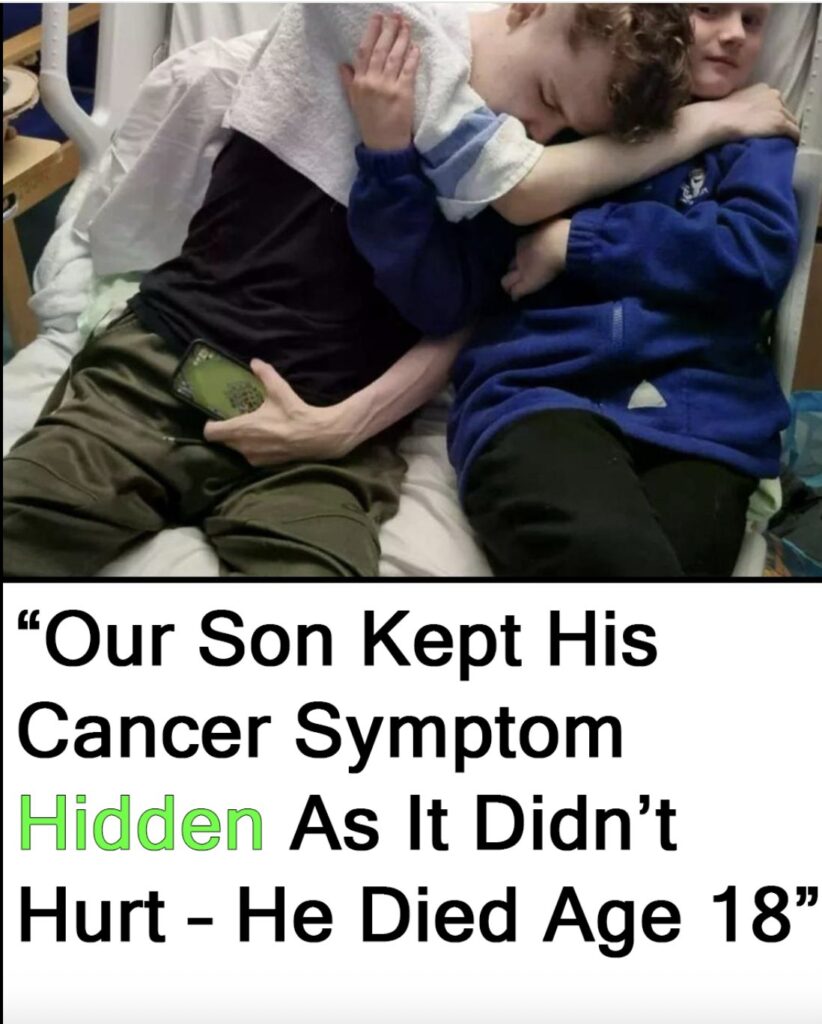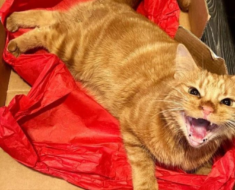Rhys Russell was just 18 when his life was taken by an illness few his age ever expect to face — a silent, aggressive form of melanoma that moved faster than anyone imagined. His story has since become both a heartbreaking cautionary tale and a rallying cry for awareness: skin cancer doesn’t only strike the elderly or those who spend years under the sun. It can happen to anyone, at any age, without warning.

It began with something small. A faint red patch appeared on Rhys’ scalp — nothing dramatic, nothing painful. It didn’t itch, didn’t bleed, and wasn’t even shaped like a mole. Hidden beneath his thick curls, it was easy to ignore. When he first noticed it under the bathroom light, he thought little of it. So did his family. Like most people, they assumed it was harmless — maybe an irritation, maybe dry skin. But as days passed, something about it didn’t sit right. His parents, both healthcare workers, decided to get it checked out “just to be safe.”
That decision changed everything.
In November 2021, after a series of tests and biopsies, doctors diagnosed Rhys with melanoma — a particularly aggressive form of skin cancer. What they didn’t yet realize was how far it had already spread. Within months, the cancer reached his liver, lungs, and other vital organs. By early 2022, the diagnosis had shifted to stage four. The speed of its progression shocked even the medical team.
Rhys began treatment immediately. There were targeted therapies, rounds of radiotherapy, and endless hospital visits. But the disease moved relentlessly, taking more from him each week — his strength, his mobility, his independence. The pain grew unbearable, yet Rhys refused to lose hope.
His father, Oli, who works as a community nurse, later spoke about those months with both heartbreak and pride. “People think melanoma is something that only happens to older people who’ve spent years in the sun,” he said. “But it can strike anyone. Sometimes it’s genetic. Sometimes it has nothing to do with sun exposure at all.”
That misunderstanding — that melanoma only affects people who tan excessively or burn easily — is one Oli has dedicated himself to correcting. “If you notice anything new or unusual on your skin, even if it seems small, talk to someone. Get it checked. Don’t assume it’s nothing,” he said. “Because going through what we went through, watching Rhys decline so fast, it’s something no parent should ever experience.”
He paused before describing the hardest part. “In those last few weeks, we watched him waste away. He couldn’t walk, then couldn’t stand. He needed a wheelchair. Eventually, he became bedbound. And because the cancer had spread to his brain, it changed him — his moods, his speech, even the way he looked at us. It was like losing parts of him before he was really gone.”
Even as the disease took his body, Rhys’ spirit stayed strong. He was a kind, funny, football-obsessed teenager — a die-hard Manchester City fan who dreamed of seeing his favorite team play live. That dream, incredibly, came true in a small but powerful way.
Through a friend of a friend, his story reached Manchester City star Jack Grealish. When Grealish learned about Rhys, he immediately arranged a Zoom call with him. During their conversation, the player thanked Rhys for being such a dedicated fan and sent him a signed jersey. It was a moment of light in an otherwise dark time — one that Rhys replayed often. In his final days, he watched that video again and again, smiling through the pain.
“He loved that call,” his mother, Lauren, said softly. “It meant the world to him.”
Rhys passed away just a few weeks later, surrounded by family. His death left an enormous void, not just in his home but in the community that had rallied around him. Friends, classmates, and strangers who had followed his journey through social media all expressed the same sentiment: they’d never forget his bravery.
In the months following his death, Oli and Lauren decided to turn their grief into purpose. They began speaking publicly about Rhys’ story — at schools, local health events, and online campaigns — to warn others about how subtle melanoma can be. They wanted to make sure young people knew the signs and understood that skin cancer doesn’t always look like the textbook pictures.
Sometimes, it’s not a mole at all. Sometimes, it’s a small red patch on the scalp. Sometimes, it’s a tiny change you only notice once.
To honor Rhys’ memory, his parents launched a GoFundMe campaign to fulfill his final wish: to have his ashes scattered at Manchester City’s Etihad Stadium memorial garden — the place he loved more than anywhere else. The fundraiser has since drawn support from fans across the UK, football clubs, and people touched by his story.
Oli often says that what keeps them going is the belief that Rhys’ life — though heartbreakingly short — can still save others. “If one person gets checked because of him, if one doctor looks closer at something that seems minor, then his death won’t have been in vain,” he said.
According to the UK’s National Health Service, melanoma is among the most aggressive forms of cancer. While it’s commonly linked to ultraviolet exposure, experts stress that it can appear in places rarely exposed to sunlight — under nails, on the scalp, between toes, even inside the mouth. Early detection is key. When caught at stage one, melanoma is treatable and survival rates are high. But once it spreads, outcomes decline rapidly.
Rhys’ case highlights that danger all too clearly. He had no major risk factors, no history of sunburns, no family record of skin cancer. Yet within a year, his life was gone.
In one of his final journal entries, Rhys wrote, “Don’t wait until something hurts to care about it.” His words now appear on the banner of his family’s awareness page — a haunting, powerful message from a young man who faced unimaginable pain with grace and courage.
His friends describe him as “the kind of person who made you laugh even when things were bad.” His teachers remember him as curious, funny, and full of promise. In photos, his wide grin radiates the kind of life that makes his loss feel doubly cruel.
Oli and Lauren say that the hardest part isn’t just the absence — it’s the what-ifs. “If we’d known,” Lauren said quietly. “If we’d caught it sooner.”
But they also know that dwelling on what can’t be changed won’t bring him back. Instead, they focus on what can still be done — spreading awareness, encouraging others to act early, and honoring their son’s legacy through education and compassion.
Their message is simple, but it carries the weight of everything they’ve endured:
Check your skin. Don’t dismiss what looks “minor.” Listen to your gut. And never assume that being young means being safe.
Rhys Russell’s story is more than a tragedy — it’s a warning and a call to action. His short life reminds us that sometimes, the most dangerous illnesses are the quietest ones. Melanoma doesn’t always announce itself loudly. Sometimes, it hides beneath a curl of hair, waiting.
And sometimes, all it takes to save a life is one moment of attention — one decision to look twice.
Rhys didn’t get that chance. But his story might give it to someone else.




